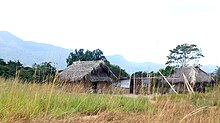Macushi
 Macushi village in Brazil | |
| Total population | |
|---|---|
| 43,192[1] | |
| Regions with significant populations | |
| 33,603 (2014)[1] | |
| 9,500 (2011)[1] | |
| 89 (2011)[1] | |
| Languages | |
| Macushi, Portuguese, English and Spanish[2] | |
| Religion | |
| Indigenous religion, Roman Catholicism | |
The Macushi (Portuguese: Macuxi) are an indigenous people living in the borderlands of southern Guyana, northern Brazil in the state of Roraima, and in an eastern part of Venezuela.[2]
Name
The Macushi are also known as the Macusi, Macussi, Makushi, Makusi, Makuxi, Teueia, and Teweya people.[2]
Language
Macushi people speak the Macushi language, a Macushi-Kapon language, which is part of the Carib language family. Some in Brazil also speak Portuguese, while some in Venezuela speak Spanish, and some in Guyana speak English. The Macushi language is written in the Latin script, and the New Testament was translated into the language in 1996.[2]
Housing and lifestyle
They live in villages linked together by tracks and paths, with houses built round a central courtyard. When married, the Macushi couple lives in the wife's family's village and the father-in-law is of great importance in Macushi kinship.
History and culture
Macushi oral history describes them as descendants of the sun's children, who created fire, as well as diseases, and they also believe they discovered Washacá, the Tree of Life. The Macushi believe in the life principle – stkaton – and they believe it comes from the sun.[citation needed]
Cuthbert Cary-Elwes, a Jesuit missionary settled among the Macushi of the Rupununi Region (Guyana) in 1909, learned the language and stayed with them for more than 23 years.[3]
During the 18th century in Brazil, non-native people occupied Macushi territory, establishing mission villages and farms and forcing Macushi people to relocate.[4] In Guyana, the Machusi settled in the Northern Rupununi Savannah.[5]
The Brazilian Government have set up schools, as well as hospitals for the Macushi and since 2005 they are campaigning for land rights to be recognized throughout Brazil.
Notable people
- Bernaldina José Pedro (1945–2020), Brazilian activist and tribal leader.[6]
- Sydney Allicock (~1955), Guyanese Vice-President.[7]
References
- ^ a b c d "Macuxi". Socio Ambiental. Retrieved 28 February 2021.
- ^ a b c d "Macushi." Ethnologue. Retrieved 30 July 2012.
- ^ "The Interior." The Jesuits in Guyana. Retrieved 30 July 2012.
- ^ "Macuxi: Introduction." Archived 2012-05-15 at the Wayback Machine Instituto Socioambiental: Povos Indígenas no Brasil. Retrieved 30 July 2012
- ^ "Amerindian nations". Ministry of Indigenous Peoples’ Affairs. Retrieved 18 August 2020.
- ^ "Bernaldina José Pedro, Repository of Indigenous Culture, Dies at 75". New York Times. Retrieved 28 February 2021.
- ^ "Sydney Allicock: the man from Iwokrama". Caribbean Beat. Retrieved 28 February 2021.
- Cuthbert, Cary-Elwes. Bridges, John, ed. Rupununi Mission: the story of Cuthbert Cary-Elwes. London: Jesuit Missionsstka, 1985.
External links
- Dramatic video shows attack on Indian village 20 June 2008
